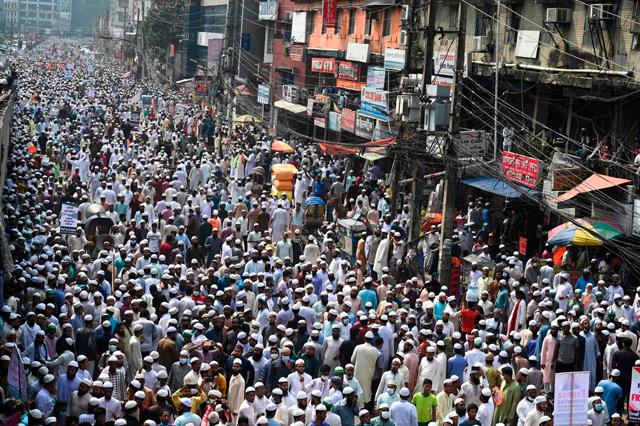- Local News
- Web-2020-10-28 | 02:59 pm

Nayrouz News Agency :
Tens of thousands of protesters marched through the Bangladesh capital on Tuesday in the biggest anti-France rally since French President Emmanuel Macron defended cartoons depicting the Prophet Mohammed.
Muslims across the world have reacted furiously to Macron's defence of the right to mock religion following the murder of a French schoolteacher who had shown his pupils cartoons of the prophet.
In Syria, people burned pictures of France's leader, tricolour flags were torched in the Libyan capital Tripoli, while French goods have been pulled from supermarket shelves in Qatar, Kuwait and other Gulf countries.
In Dhaka, protesters set alight an effigy of Macron during Tuesday's march, in which police said 40,000 people took part.
Hundreds of armed officers used a barbed-wire barricade to stop the demonstrators, who dispersed without violence before they could get close to the French embassy.
The rally was called by "Islami Andolon Bangladesh” (IAB), one of the country's largest "Islamist” parties, and started at the biggest mosque in the nation.
"Boycott French products", demonstrators chanted.
A protester called on the Bangladesh government to "kick out" the French ambassador, while another protest leader, Hasan Jamal, said activists would "tear down every brick of that building" if the envoy was not ordered out.
The October 16 beheading of high-school teacher Samuel Paty by a Chechen extremist caused deep shock in France.
Paty had shown his students some of the Prophet Mohammed "cartoons”, over which 12 people were massacred at the satirical magazine Charlie Hebdo in 2015.
Depictions of the Prophet Mohammed are seen as offensive by many Muslims, but in France such "cartoons” have become identified with a proud secular tradition dating back to the Revolution and the issue of freedom of expression.
In the aftermath of Paty's murder, Macron issued a passionate defence of free speech and France's secular way of life, vowing that the country "will not give up cartoons".
France has been targeted in a string of terrorist attacks that have killed over 250 people since 2015 and led to deep soul-searching over the impact of "Islam” on the country's core values.
Some of the attackers have cited such "cartoons” as well as France's ban on wearing the veil in public as among their motives.
Several suspects have been arrested in dozens of raids since Paty's murder.
Some 50 organisations with alleged links to "radicalisation”, as well as a mosque outside Paris, have also been earmarked for closure by the government.
Earlier this month, Macron unveiled a plan to defend France's secular values against a trend of "Islamist separatism", and described Islam as a religion "in crisis".









